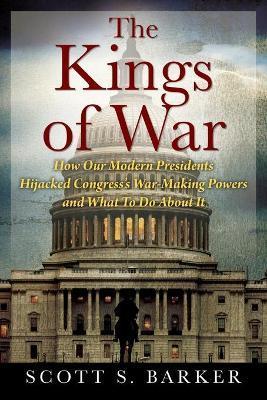The Kings of War: How Our Modern Presidents Hijacked Congress's War-Making Powers and What To Do About It

The Kings of War: How Our Modern Presidents Hijacked Congress's War-Making Powers and What To Do About It
The thesis of this book is that our modern Presidents have hijacked Congress's constitutional war-making powers, making themselves the "kings of war." Under the Constitution, only Congress has the power to declare war. However, beginning with President Truman, our Presidents have claimed the "inherent" power as commanders in chief to commit the nation to war without congressional authorization. This power grab has had a profound effect on the balance of power between Congress and the presidency. It is the key ingredient in our current "executive-centric" national government. The book first explores how and why this happened. It begins with an historical account of the Constitutional Convention's treatment of the war-making power and the system adopted by the framers that divided the responsibilities between Congress (which decided whether war should be conducted) and the President (who conducted the war, subject to Congress's on-going power of the purse). There is a major chapter on the Northwest Indian War, under the Washington administration, which was the first war fought under the Constitution. Washington presided at the Constitutional Convention and believed that the decision to go to war was committed to Congress. Accordingly, as that war unfolded, Washington repeatedly went to Congress to request the resources he needed to fight the war. The book then explores the drastic change in that system beginning with President Truman's unilateral decision to commit the nation to war on the Korean Peninsula, and its development through the Cold War, the Vietnam War and finally President George W. Bush's most aggressive claim to the President's war powers in the invasion of Iraq in 2003. There is also a chapter on the special constitutional challenges presented by the advent of nuclear weapons. The book ends with an analysis of the factors that have allowed the presidency's power grab and proposes a legislative agenda to restore the war powers system to the one enshrined in the Constitution.
PRP: 151.78 Lei
Acesta este Prețul Recomandat de Producător. Prețul de vânzare al produsului este afișat mai jos.
136.60Lei
136.60Lei
151.78 LeiLivrare in 2-4 saptamani
Descrierea produsului
The thesis of this book is that our modern Presidents have hijacked Congress's constitutional war-making powers, making themselves the "kings of war." Under the Constitution, only Congress has the power to declare war. However, beginning with President Truman, our Presidents have claimed the "inherent" power as commanders in chief to commit the nation to war without congressional authorization. This power grab has had a profound effect on the balance of power between Congress and the presidency. It is the key ingredient in our current "executive-centric" national government. The book first explores how and why this happened. It begins with an historical account of the Constitutional Convention's treatment of the war-making power and the system adopted by the framers that divided the responsibilities between Congress (which decided whether war should be conducted) and the President (who conducted the war, subject to Congress's on-going power of the purse). There is a major chapter on the Northwest Indian War, under the Washington administration, which was the first war fought under the Constitution. Washington presided at the Constitutional Convention and believed that the decision to go to war was committed to Congress. Accordingly, as that war unfolded, Washington repeatedly went to Congress to request the resources he needed to fight the war. The book then explores the drastic change in that system beginning with President Truman's unilateral decision to commit the nation to war on the Korean Peninsula, and its development through the Cold War, the Vietnam War and finally President George W. Bush's most aggressive claim to the President's war powers in the invasion of Iraq in 2003. There is also a chapter on the special constitutional challenges presented by the advent of nuclear weapons. The book ends with an analysis of the factors that have allowed the presidency's power grab and proposes a legislative agenda to restore the war powers system to the one enshrined in the Constitution.
Detaliile produsului









